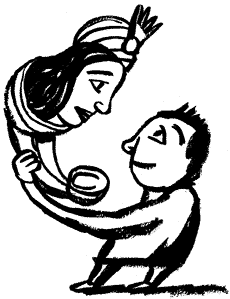What Psychic Friends Failed to Foresee
Nowadays, what makes a company successful rarely keeps it successful.

It's been a busy few weeks in the history of American kitsch. First Planet Hollywood announced it was hemorrhaging money, then Jean-Claude Van Damme got cold-cocked in a strip joint, and now the Psychic Friends Network is no more. Its parent company, Inphomation Communications Inc., has filed for bankruptcy, claiming that it has $26 million in liabilities and $1.2 million in assets. What's next? A revelation that Walt Disney really isn't preserved cryogenically?
The big loser in the demise of Psychic Friends is, of course, chanteuse Dionne Warwick, who's been the key spokeswoman for the network for almost five years now. You might have thought that Warwick would have seen this coming two decades ago, when, on the advice of a psychic, she added an "e" to her last name and watched her singing career go into the tank. But, like so many others, Warwick's faith in the business of getting poor and desolate people to shell out enormous amounts of money they really shouldn't be spending for worthless advice remained unshaken.
The economics of the psychic phone business are, in fact, about as straightforward as that. At $3.99 a minute, the goal is to get people to stay on the line for as long as possible--though not so long that they run up massive bills they will deny having amassed--and to keep them coming back. As a result, especially in the last few years, the psychic business has tried to focus on establishing continuing relationships between individual psychics and their customers. ("I don't want just any psychic! I want to speak to Clarissa!") The implicit therapeutic element to consulting a psychic has thus been made more explicit. After all, a good analyst costs ... well, there may not be such a thing as a good analyst, but you get the point.
Still, while the psychic business model is uncomplicated, its very simplicity poses a very real problem to the dominant players in the field, since it means that the barriers to entry are remarkably low. (The really big winners in the phone-psychic--as in the phone-sex--business are actually the phone companies, since they take a chunk of every call and provide only the line.) Since most psychics work out of their homes, you don't even need that archetypal room with a bunch of telephones in it. All you need is a few ads in the back of a magazine, maybe a commercial on that cable channel that tells you what's going to be on other channels in the next hour and a half, plus a gimmick, and you're in. In part, of course, that's why building customer loyalty to particular psychics is so crucial. But it's also why constantly differentiating yourself from the competition is essential. The threat of commoditization, in other words, is omnipresent. (For more on the commoditization scramble, click here.) And here the Psychic Friends Network really fell down on the job.
"They just didn't change the product enough," says journalist Stephen Glass, who recently detailed his personal adventures as a telephone psychic (for the Psychic Believers Network) in an article in Harper's. "If you look at other networks, they do ads focusing on the lottery, on romance, on work. They just keep re-packaging and re-spinning the product. But Psychic Friends was stuck with these infomercials which just pushed psychics generally."

F ailing to target its pitches--neglecting to emphasize that psychics can help you win, or at least tell you you're going to win large sums of money or find that woman of your dreams--was certainly Psychic Friends' first big mistake. A probably more telling error was getting locked into the infomercial model of advertising. While its competitors looked to the 60-second or two-minute ad to push the product, Psychic Friends remained enamored of the 30-minute pitch, with Dionne smiling her toothy smile and everything looking vaguely like it was still 1979. (Do you really think it's a coincidence that both Gary Coleman of Diff'rent Strokes and Ted Lange of The Love Boat--he was Isaac the bartender--were Psychic Friends salesmen?)
The decision to stick with the infomercial model was certainly understandable. After all, the company is called Inphomation, and its main business was the production and distribution of infomercials. And the Psychic Friends infomercials had been among the most popular in history. Between 1993 and 1994, they aired more than 12,000 times, and at one point Inphomation was shelling out half a million dollars a week to buy air time on cable stations. It was money well spent: At its peak, Psychic Friends was bringing in as much as $125 million a year, most of it through infomercials.
Psychic Friends was not alone. The infomercial boom of the late 1980s and early 1990s was a logical response to the deregulation of cable television in 1984--which means that, like so much else, we can blame Psychic Friends on Ronald Reagan. As the number of cable channels exploded, so too did the demand for programming. Infomercials were an ideal cash cow for the cable networks, since they actually got paid to air them.
But cable has changed in recent years, as relatively more substantive programming alternatives have emerged (the Classic Sports Network or the Cooking Channel may not be high art, but they are better than another Ab Roller ad), and as the infomercial market became saturated. Those Psychic Friends programs had probably reached a point of diminishing returns, but Inphomation was stuck in an old mindset--a classic case of a company not realizing that what had made it successful would not keep it successful in the future. GE's Jack Welch is fond of saying that the key to success is changing before you have to. Inphomation couldn't change even after it had to. And the fact that this utter failure of foresight happened to the Psychic Friends Network takes us, needless to say, somewhere beyond irony.
I don't want to belabor that point (though it is fun, as all the "They should have seen it coming" headlines on stories about Inphomation's bankruptcy suggest). Still, it's worth recognizing that Psychic Friends was an enterprise created as a response to people's uncertainty about the world (it's probably no accident that it cropped up around the time of the Gulf War). And yet it ended up foundering as a result of the inherent uncertainty of the free-market system. Still a larger question remains: Why don't companies ever quit while they're ahead?
Imagine if Michael Lasky, the former racing handicapper who ran Inphomation into the ground, had seen two years ago that margins were going to decline, that in the absence of any professional requirements more and more psychics would be entering the market, that the time for infomercials had passed, and that the Psychic Friends brand name had hit its peak. And imagine if, at that point, he had liquidated the company and instead deployed his capital elsewhere (by buying stock in AOL or something). Today, the memory of Psychic Friends would live on in all our minds as a great and kooky American success story; we wouldn't have hundreds of psychics worried about their futures; and Lasky would still be ridiculously wealthy.
In the end, it may be that most companies have naturally short life spans and recognizing that life span and getting out before it's over is a rare but crucial talent (one Lasky clearly didn't have). We've been conditioned, by a century of Fortune 500 companies, to see the large, decades-old corporation as the model for all business. But much of the time, striving for longevity means ending up in bankruptcy. Psychic Friends, like Michael Jordan, could have gone out at the top of its game. Some crystal ball.